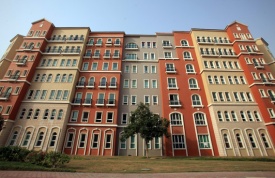26.08.2014

The market needs to focus on middle-income housing to maintain stability, says a new report by real estate consultancy Phidar Advisory. Rents in Dubai are falling in the first half of Q3 2014, according to data by Phidar Advisory, which revealed average lease rates going down by 2.9% for apartments and 5.6% for villas.
“Although the market is technically undersupplied, rent inflation has slowed. This is likely due to ambitious expectations in H1-2014 that pushed up asked rents beyond affordability constraints. Housing demand is relatively elastic, but alternatives, like sharing and relocation to other emirates, exist and form an – albeit pliable – ceiling,” the Dubai-based property consultancy said in a new report.
Despite this, on a yearly basis, rents are still up. When looking at apartments, Q3 nominal rates remained resilient in beach front communities such as Jumeirah Beach Residence (1.0%) and Shoreline (2.7%). For SFHs, Palm Jumeirah and Jumeirah Islands showed positive signs with 3.3% growth in nominal rates, while other communities declined.
Based on transaction data from the first six weeks of Q3 2014, the consultancy reveals nominal prices for single family homes (SFHs - villas) declined 4% and apartments declined 0.6 %.
Apartment and SFH sale price performance varied across Dubai. For apartments, the Greens increased by 0.26%, but Uptown Motor City decreased by 0.94%. For SFHs, Jumeirah Islands declined 8.4%, but the Lakes increased 6.4 %.
According to Phidar, as a result of the slowing down in growth Dubai needs nearly 30,000 additional units through 2018 to maintain rent stability.
“Residential development opportunities are still ample in Dubai, but the market would benefit exponentially from developer specialisation, particularly in the most under-supplied assets (middle income housing),” the report says.
“Development trends are tapping into Dubai’s relatively top heavy income distribution (compared to other mature markets) and second home demand, but it is not adequately addressing supply gaps for the main drivers of Dubai economy: middle income expatriate residents,” the report says.“This trend should be a serious concern for business owners and government bodies: rapid rent inflation increases labor costs and can stymie job and real economic growth.”
“Although the market is technically undersupplied, rent inflation has slowed. This is likely due to ambitious expectations in H1-2014 that pushed up asked rents beyond affordability constraints. Housing demand is relatively elastic, but alternatives, like sharing and relocation to other emirates, exist and form an – albeit pliable – ceiling,” the Dubai-based property consultancy said in a new report.
Despite this, on a yearly basis, rents are still up. When looking at apartments, Q3 nominal rates remained resilient in beach front communities such as Jumeirah Beach Residence (1.0%) and Shoreline (2.7%). For SFHs, Palm Jumeirah and Jumeirah Islands showed positive signs with 3.3% growth in nominal rates, while other communities declined.
Based on transaction data from the first six weeks of Q3 2014, the consultancy reveals nominal prices for single family homes (SFHs - villas) declined 4% and apartments declined 0.6 %.
Apartment and SFH sale price performance varied across Dubai. For apartments, the Greens increased by 0.26%, but Uptown Motor City decreased by 0.94%. For SFHs, Jumeirah Islands declined 8.4%, but the Lakes increased 6.4 %.
According to Phidar, as a result of the slowing down in growth Dubai needs nearly 30,000 additional units through 2018 to maintain rent stability.
“Residential development opportunities are still ample in Dubai, but the market would benefit exponentially from developer specialisation, particularly in the most under-supplied assets (middle income housing),” the report says.
“Development trends are tapping into Dubai’s relatively top heavy income distribution (compared to other mature markets) and second home demand, but it is not adequately addressing supply gaps for the main drivers of Dubai economy: middle income expatriate residents,” the report says.“This trend should be a serious concern for business owners and government bodies: rapid rent inflation increases labor costs and can stymie job and real economic growth.”






